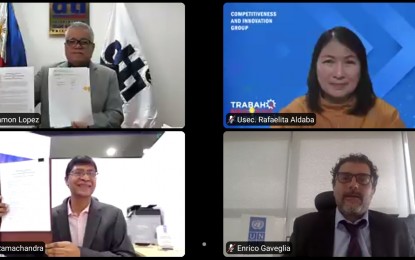
ONLINE PLATFORM. Trade Secretary Ramon Lopez (top left) and United Nations Development Programme (UNDP) in the Philippines Resident Representative Selva Ramachandran (bottom left) sign the Memorandum of Understanding (MOU) for Enhanced Manufacturing of Protective Wear and Equipment for Covid-19 Response in the Philippines or Empower PH online platform on Nov. 27, 2020. Trade Undersecretary Rafaelita Aldaba (top right) and UNDP Deputy Resident Representative Enrico Gaveglia (bottom right) witness the signing ceremony. (Screengrab from Empower PH online launching)
MANILA – The United Nations Development Programme in the Philippines (UNDP) and the Department of Trade and Industry (DTI) launched Friday the Empower PH, a digital platform that connects manufacturers, suppliers, users, and beneficiaries of protective wear.
Empower PH or Enhanced Manufacturing of Protective Wear and Equipment for Covid-19 Response in the Philippines aims to bridge the domestic demand for personal protective equipment (PPE) to local manufacturers and suppliers of these products critical to mitigate the coronavirus disease 2019 (Covid-19) infection.
The online matchmaking platform can be accessed through empower.dti.gov.ph that will facilitate business-to-business matching for enhanced manufacturing and production of PPE, as well as other medical equipment and consumables needed for the country’s Covid-19 response.
DTI Secretary Ramon Lopez and UNDP Resident Representative Selva Ramachandran formally signed a memorandum of understanding (MOU) affirming their commitments to strengthen partnership for the development, maintenance, and upgrading of the Empower PH online platform.
“This innovative venture will provide a collaborative platform between various stakeholders to facilitate and accelerate production and distribution of essential items to meet the increasing demand for PPEs. It will also ensure product quality standards, democratize knowledge and resources, facilitate an effective supply chain, and provide livelihood opportunities,” Lopez said in his keynote message.
All protective wear available on the online platform are Philippine-made products, a move to support the recovery of local industries after the economic setbacks brought by the pandemic.
“From garments manufacturing factories that will repurpose their operations to micro, small, and medium enterprises (MSMEs), there is great potential in their use of this platform for future business activities locally and externally. This, in turn, would create more job and employment opportunities for our people,” Lopez added.
Moreover, Philippine Disaster Resilience Foundation (PDRF) chief resilience officer and advisor Guillermo Luz said other initiatives are needed for the local PPE industry to flourish.
Luz said streamlining of the procurement process is needed not only for PPE but also ventilators and vaccines so more suppliers can join the bidding for Covid-19 essential products.
He added MSME protective wear makers should not be left out and should be linked to certain markets where they can supply their products.
“We need to sew buyers for MSMEs because they are like (an) inclusive growth strategy. If we limit all the supply to large corporations because of the complications of procurement in our system, I think we’re still going to leave a lot of MSMEs,” Luz said.
He added the country has to build up a national quality infrastructure ecosystem for local manufacturers to test the standard of their PPE in the Philippines and reduce the process of sending these products abroad for testing.
“You can build a product here. But to test the product and to certify it abroad, it’s just really a waste of resources and waste of time,” Luz said. “So we need to build up our own testing and certification ecosystem in the country so we can test all products and make sure they are compliant with international standards.” (PNA)
